初中英语动词ing用法小结
初中英语动词ing 用法小结
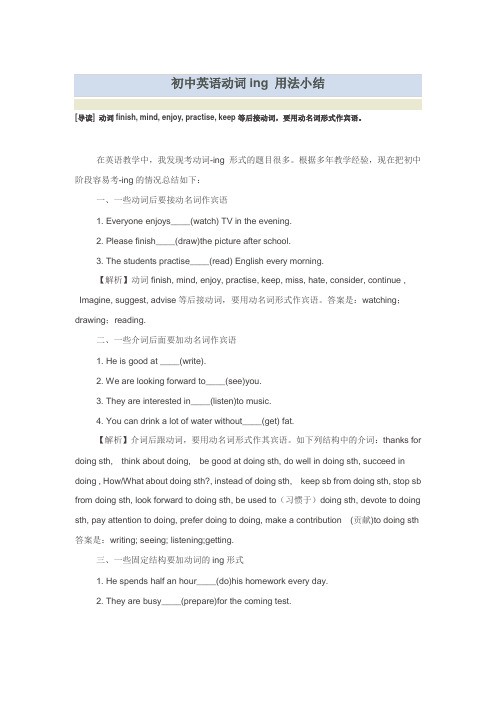
[导读] 动词finish, mind, enjoy, practise, keep等后接动词,要用动名词形式作宾语。
在英语教学中,我发现考动词-ing 形式的题目很多。
根据多年教学经验,现在把初中阶段容易考-ing的情况总结如下:一、一些动词后要接动名词作宾语1. Everyone enjoys____(watch) TV in the evening.2. Please finish____(draw)the picture after school.3. The students practise____(read) English every morning.【解析】动词finish, mind, enjoy, practise, keep, miss, hate, consider, continue , Imagine, suggest, advise等后接动词,要用动名词形式作宾语。
答案是:watching;drawing;reading.二、一些介词后面要加动名词作宾语1. He is good at ____(write).2. We are looking forward to____(see)you.3. They are interested in____(listen)to music.4. You can drink a lot of water without____(get) fat.【解析】介词后跟动词,要用动名词形式作其宾语。
如下列结构中的介词:thanks for doing sth, think about doing, be good at doing sth, do well in doing sth, succeed in doing , How/What about doing sth?, instead of doing sth, keep sb from doing sth, stop sb from doing sth, look forward to doing sth, be used to(习惯于)doing sth, devote to doing sth, pay attention to doing, prefer doing to doing, make a contribution (贡献)to doing sth 答案是:writing; seeing; listening;getting.三、一些固定结构要加动词的ing形式1. He spends half an hour____(do)his homework every day.2. They are busy____(prepare)for the coming test.3. We have a great time____(talk)to each time at lunchtime.【解析】在一些固定结构中要求使用动词-ing形式。
动词ing形式的用法及变化规则

动词ing形式的用法及变化规则动词ing形式的用法及变化规则口诀:现在听我说,动词ing别忘了,加了ing要加be。
动词现在分词是由动词原形在词尾加ing构成的。
具体规则如下:1.一般情况下,直接在动词原形后加ing。
例如:think—thinking。
sleep—sleeping。
study—studying。
speak—speaking。
carry—carrying。
say—saying。
2.以不发音的字母e结尾的单词,在加ing前要去掉e。
例如:wake—waking。
make—making。
come—coming。
take—taking。
leave—leaving。
have—having。
3.以重读闭音节结尾,呈现“辅音,元音(a e i o u),辅音”结构的动词,先双写末尾的辅音字母,再加ing。
例如:shop。
begin。
cut。
put。
get。
hit。
run。
set。
sit。
spit。
swim。
beg。
drop。
fit。
nod。
dig。
et。
regret。
rid等。
注意:visit不是以重读闭音节结尾,不用双写。
而XXX 虽然重读第一音节,词尾音节不重读,但是现在分词仍要双写末尾辅音字母,然后再加ing,如:XXX。
初中阶段此类词只有这一个。
4.以ie结尾的动词,把ie改为y,再加ing。
例如:die—dying。
XXX—lying。
一、写出下列动词的现在分词形式:work—working。
visit—visiting。
play—playing。
study—studying。
dance—dancing。
have—having。
travel—travelling。
take—taking。
drop—dropping。
sing—singing。
shop—shopping。
swim—swimming。
XXX—lying。
二、选择题练:1.Who is singing over there now。
初中英语常考的动词+动词-ing和动词不定式的总结
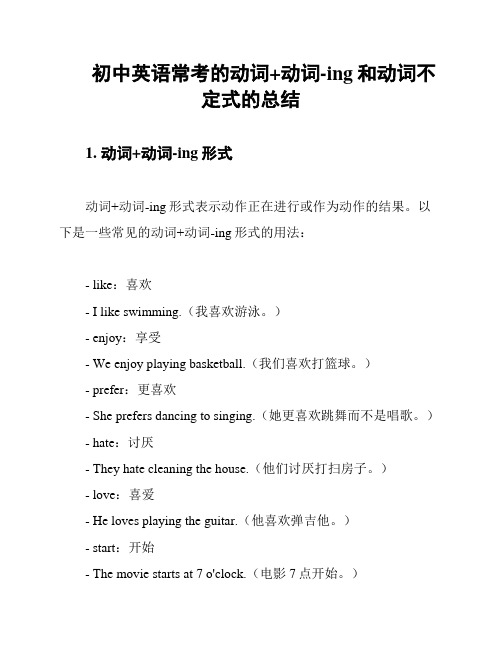
初中英语常考的动词+动词-ing和动词不定式的总结1. 动词+动词-ing形式动词+动词-ing形式表示动作正在进行或作为动作的结果。
以下是一些常见的动词+动词-ing形式的用法:- like:喜欢- I like swimming.(我喜欢游泳。
)- enjoy:享受- We enjoy playing basketball.(我们喜欢打篮球。
)- prefer:更喜欢- She prefers dancing to singing.(她更喜欢跳舞而不是唱歌。
)- hate:讨厌- They hate cleaning the house.(他们讨厌打扫房子。
)- love:喜爱- He loves playing the guitar.(他喜欢弹吉他。
)- start:开始- The movie starts at 7 o'clock.(电影7点开始。
)- finish:完成- They finished cooking dinner.(他们完成了晚饭的烹饪。
)- keep:继续- Please keep talking.(请继续讲话。
)- continue:继续- The rain continued falling.(雨一直在下。
)- stop:停止- He stopped playing the piano.(他停止弹钢琴。
)- avoid:避免- We should avoid making mistakes.(我们应该避免犯错误。
)2. 动词+动词不定式形式动词+动词不定式形式通常表示一个动作的目的、意图或计划。
以下是一些常见的动词+动词不定式形式的用法:- want:想要- decide:决定- They decided to go on a trip.(他们决定去旅行。
)- plan:计划- She plans to study abroad.(她计划出国留学。
)- hope:希望- try:尝试- He tried to solve the math problem.(他尝试解决数学问题。
初中英语中动词ing的灵活应用
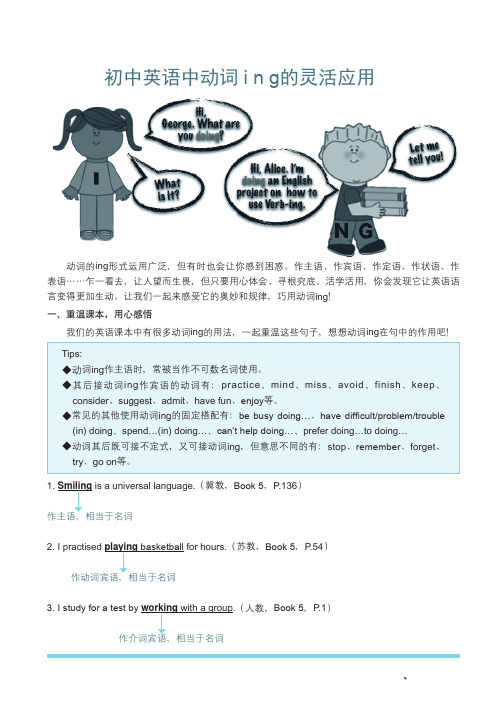
初中英语中动词 i n g的灵活应用动词的ing形式运用广泛,但有时也会让你感到困惑。
作主语、作宾语、作定语、作状语、作表语……乍一看去,让人望而生畏,但只要用心体会、寻根究底、活学活用,你会发现它让英语语言变得更加生动。
让我们一起来感受它的奥妙和规律,巧用动词ing!一、重温课本,用心感悟我们的英语课本中有很多动词ing的用法,一起重温这些句子,想想动词ing在句中的作用吧!Tips:◆动词ing作主语时,常被当作不可数名词使用。
◆其后接动词ing作宾语的动词有:practice、mind、miss、avoid、finish、keep、consider、suggest、admit、have fun、enjoy等。
◆常见的其他使用动词ing的固定搭配有:be busy doing…、have difficult/problem/trouble(in) doing、spend…(in) doing…、can’t help doing…、prefer doing…to doing…◆动词其后既可接不定式,又可接动词ing,但意思不同的有:stop、remember、forget、try、go on等。
1. Smiling is a universal language.(冀教,Book 5,P.136)作主语,相当于名词2. I practised playing basketball for hours.(苏教,Book 5,P.54)作动词宾语,相当于名词3. I study for a test by working with a group.(人教,Book 5,P.1)作介词宾语,相当于名词(外研社,Book 5,P.51)(人教,Book 5,P. 51)(人教,Book 2,P.31)be+Ving)构成谓语(人教,Book 5,P. 110)(外研社,Book 6,P.30)NoBook 3,P.3)go+动词(苏教,Book 5,P.50);时间状语从句的省略11. Today, the popularity of basketball has risen around the world, with many young people(人教,Book 5,P.46)with+宾语+动词ing,表示主动、伴随。
初中英语带动词ing形式句型总结
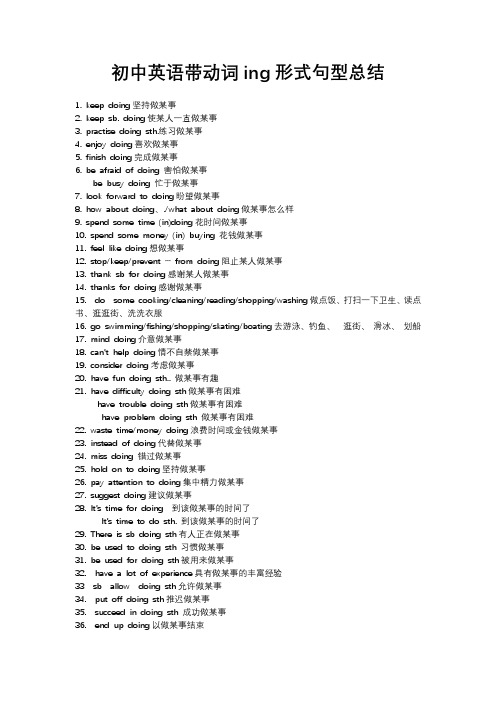
初中英语带动词ing形式句型总结1. keep doing坚持做某事2. keep sb. doing使某人一直做某事3. practise doing sth.练习做某事4. enjoy doing喜欢做某事5. finish doing完成做某事6. be afraid of doing 害怕做某事be busy doing 忙于做某事7. look forward to doing盼望做某事8. how about doing、./what about doing做某事怎么样9. spend some time (in)doing花时间做某事10. spend some money (in) buying 花钱做某事11. feel like doing想做某事12. stop/keep/prevent …from doing阻止某人做某事13. thank sb for doing感谢某人做某事14. thanks for doing感谢做某事15. do some cooking/cleaning/reading/shopping/washing做点饭、打扫一下卫生、读点书、逛逛街、洗洗衣服16. go swimming/fishing/shopping/skating/boating去游泳、钓鱼、逛街、滑冰、划船17. mind doing介意做某事18. can’t help doing情不自禁做某事19. consider doing考虑做某事20. have fun doing sth.. 做某事有趣21. have difficulty doing sth做某事有困难have trouble doing sth做某事有困难have problem doing sth 做某事有困难22. waste time/money doing浪费时间或金钱做某事23. instead of doing代替做某事24. miss doing 错过做某事25. hold on to doing坚持做某事26. pay attention to doing集中精力做某事27. suggest doing建议做某事28. It’s time for doing 到该做某事的时间了It’s time to do sth. 到该做某事的时间了29. There is sb doing sth有人正在做某事30. be used to doing sth 习惯做某事31. be used for doing sth被用来做某事32. have a lot of experience具有做某事的丰富经验33 sb allow doing sth允许做某事34. put off doing sth推迟做某事35. succeed in doing sth 成功做某事36. end up doing以做某事结束37. give up doing放弃做某事。
英语动词ing的用法总结

英语动词ing的用法总结
1. 作为动词的进行时态,表示正在进行或进行中的动作。
例如:I am studying English.(我正在学习英语。
)
2. 作为名词,表示一种行为或状态。
例如:Swimming is my favorite sport.(游泳是我最喜欢的运动。
)
3. 作为形容词,表示引起动作或状态的物体或事物。
例如:The running water is very cold.(流动的水很冷。
)
4. 作为分词形式,构成现在分词和过去分词。
现在分词表示主动或进行的动作,常用于进行时态和作定语。
过去分词表示被动或完成的动作,常用于被动语态或完成时态。
例如:The girl is singing.(这个女孩正在唱歌。
)
The broken window needs to be fixed.(这个破窗户需要修理。
)
5. 和某些动词连用构成特定的短语动词,具有特定的意义。
例如:go swimming(去游泳)、keep doing(一直做某事)、enjoy reading(喜欢阅读)
6. 在某些固定词组中作为名词或形容词。
例如:a running nose(流鼻涕)、a burning desire(炙热的渴望)。
英语ing的用法口诀
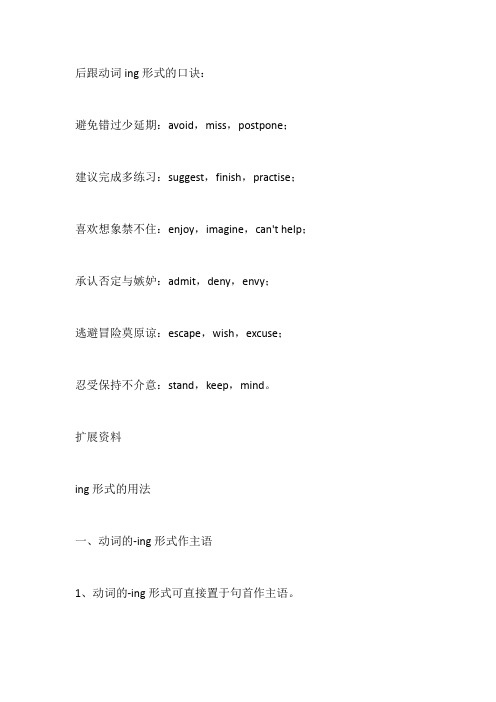
后跟动词ing形式的口诀:
避免错过少延期:avoid,miss,postpone;
建议完成多练习:suggest,finish,practise;喜欢想象禁不住:enjoy,imagine,can't help;承认否定与嫉妒:admit,deny,envy;
逃避冒险莫原谅:escape,wish,excuse;
忍受保持不介意:stand,keep,mind。
扩展资料
ing形式的用法
一、动词的-ing形式作主语
1、动词的-ing形式可直接置于句首作主语。
Seeing is believing.
百闻不如一见。
2、为了保持句子平衡,通常用先行词it作形式主语,而把真正的主语放在句末。
It is easy making plans, but it is difficult carrying them.
制定计划很容易,实行它却很难。
二、动词的-ing形式作表语
动词的-ing形式作表语的有两种不同的含义:
1、表示主语的内容是什么。
2、表示主语具有的特征。
三、动词的-ing形式作宾语
动词的-ing形式既可作及物动词的宾语,也可作介词的宾语。
第十三章动词-ing形式(思维导图+知识梳理+好题精炼)2022-2023初中英语中考语法归纳

第十三章动词-ing形式思维导图知识梳理一、动名词的定义动词-ing形式分为两类:动名词和现在分词.动名词在句中起名词作用,现在分词在句中起形容词或副词作用.动名词是一种动词的非谓语形式,它兼有动词和名词的特征,由动词原形加词尾-ing而成,其构成法与现在分词一样.动名词有时态和语态的变化.(以do为例)二、动词-ing 形式的句法作用从性质上讲,动词的-ing形式相当于名词、形容词、副词.因此,它在句中可用作主语、表语、定语、宾语、状语和宾语补足语.(一)作主语动词-ing形式作主语通常表示一种抽象的动作概念,即泛指某种行为或动作.Eating too much is bad for your health.吃得太多对身体健康有害.Is playing basketball after lunch good or bad for your health?吃完午饭就打篮球对身体健康有益还是有害?Travelling abroad can widen one's outlook.出国旅行会扩大人们的视野.点拨(1)动词-ing形式短语作主语,通常有两种位置:一是放在句首,如上述例句所示;一是用it作形式主语,而将-ing分词短语移到谓语部分之后,以避免句子结构头重脚轻.Having his brother here will make him happier.It will make him happier having his brother here.让他的兄弟待在这里将会使他高兴一些.Swimming in this river is dangerous.It is dangerous swimming in this river.在这条河中游泳很危险.(2)动词-ing形式作主语还可以用于“There is no+-ing形式”(····是不可能的)结构.There is no smoking here.这里不许吸烟.There is no joking about such matters.这件事开不得玩笑.(二)作表语动词-ing形式(短语)作表语有时起名词作用,泛指动作,有时起形容词作用,指主语的性质、状态.His hobby is collecting stamps.他的爱好是集邮.The news is exciting.这消息令人兴奋.The food smells inviting.这道菜香味怡人.My favourite sport is playing table tennis.我最喜欢的运动是乒乓球.The only thing she is interested in is dancing.她唯一感兴趣的就是跳舞.点拨不要把作表语的-ing形式与进行时态相混淆.-ing形式作表语表示主语的某种特征,而进行时态则表示正在进行的动作.试比较:Her job is teaching.她的工作是教书.(teaching是表语)She is teaching there now.她正在那儿上课.(is teaching是现在进行时态)(三)作定语动词-ing形式作定语只表明它所修饰的词的用途、所属关系等,置于被修饰词之前.a working method 工作方法 a dining car 餐车a swimming pool 游泳池building materials 建材(四)作宾语在某些动词:suggest, finish, avoid, stop, can't help, mind(在乎),admit, advise,consider, deny, enjoy, require, postpone, delay, practise, fancy, excuse, pardon, miss(错过)等后面不能用不定式,而必须用动名词作为宾语.I can't help laughing.我禁不住笑了起来.Return the book to the library as soon as you finish reading it.你一看完这本书就还回图书馆.He enjoys watching TV plays.他喜欢看电视剧.点拨有些动词后既可用动名词,也可用不定式.在动词love, like, begin, start, continue等后,既可用动名词作宾语,也可用不定式作宾语,有时两种结构的意义差别不大.(五)作宾语补足语动词的-ing形式用作宾语补足语,常用在:see, hear, notice, watch, keep, find, feel, get, have等动词之后,与一个名词或代词构成复合宾语;其中宾语和宾语补足语是主谓关系.I saw him walking across the street.我看见他穿过街道.He kept me waiting for a long time.他让我等了很长时间.We watched the army marching down the street towards the park.我们观看部队沿街道朝公园行走.I heard her playing the piano.我听见她在弹钢琴.点拨在see, hear, feel, watch, notice等动词之后,既可用动词-ing形式也可用(不带to的)动词不定式作宾语补足语:如用动词-ing形式,通常表示动作正在进行;用动词不定式,则表示(或强调)动作从开始到结束的全过程.(六)作状语动词的-ing形式短语作状语时,通常都表示主语正在进行的另一动作,用来对谓语动词表示的动作加以修饰或作为陪衬,它可表示时间、原因、结果、条件、让步、方式或伴随动作,相当于相对应的状语从句.Seeing the teacher entering the room, the students stood up. =When the students saw the teacher entering the room, they stood up.学生(们)看见老师进房间,都站了起来.(两个动作同时发生)Being ill, I went home.=Because I was ill, I went home.由于生病,我回家了.The snow lasted a week, resulting in a serious traffic confusion in the whole area.=The snow lasted a week, so it resulted in a serious traffic confusion in the whole area.雪下了一个星期,造成整个地方的严重交通混乱.Be careful when crossing the street.过马路时,要小心.The students walked out of the classroom, laughing and talking.学生们有说有笑走出教室.点拨动名词也可以和about, against, at, before, after, by, besides, for, from, in, on, upon, without等介词构成短语,作状语用.Without saying good-bye, she left him.未告别,她就离开了他.After reading the passage twice, he began to do the exercises.这段文章看了两遍后,他就开始做练习了.Upon returning from Beijing, he went to visit his friend.从北京一回来,他马上就去拜访朋友.三、-ing分词的否定式-ing分词是动词的一种非限定形式,其否定式是一律在其前面加否定词“not”或“never”构成.如:I think it will do you a lot of good not going.我觉得不去对你会有好处的.I left at noon, not staying for lunch.我是中午走的,没有留下来吃午饭.I'm sorry for not having informed you of the meeting.抱歉没通知你开会.I regret not having gone together with her.我后悔没有跟她一起去.四、-ing分词常用于下列句型中It's no use... It's no good...Having difficulty/ trouble... There is no...It's no use doing experiments but not considering the results.不考虑结果做实验没有用.It's no good not combining theory with practice.不把理论和实践结合就没有用.I have trouble running a long distance.我跑长跑有困难.There is no denying the fact that we are still backward.不容否认,我们仍然落后.五、动名词的独立主格结构-ing分词也可以用于独立主格结构,由“主格名词或代词+-ing分词”构成,表示时间、条件、原因、伴随情况等.The clock striking eight, they began working.时钟敲了8响,他们就开始工作了.(表示时间)The weather being fine, we went for a walk.由于天气好,我们出去散散步.(表示原因)Time permitting, we'll come to see you. 如果时间允许,我们就来看你.(表示条件)也可由“with/without+宾语+-ing分词”构成独立主格结构,表示伴随情况.如:You must not sit with your feet pointing at another person.坐着时不要把脚朝着别人.六、动名词作宾语和动词不定式作宾语含义不同部分动词可加动名词作宾语,也可加动词不定式作宾语,但意思不同,如:(一)remember doing sth.表示“记得过去做过的一件事”,remember to do sth.表示“记得要去做某事”I remember seeing him once somewhere.我记得在哪里见过他一次.Remember to see him before he goes away.记住在他离开之前看他.(二)regret doing sth.表示“对过去做过的事情后悔”,regret to do sth.表示“对还没做或将要做的事情表示遗憾”I regret telling you the bad news.我后悔把这个坏消息告诉你.I regret to say I'm unable to help you.很抱歉我不能帮助你.(三)stop doing sth.表示“停止正在做的事情”,stop to do sth.表示“停止什么,然后去做另一件事情”Let's stop talking about it.咱们停止谈论这件事情吧.We stopped to see what happened.我们停下来去看发生了什么事情.(四)forget doing sth.表示“忘记曾做过某事”,forget to do sth.表示“忘记去做某事”I forgot giving the letter to her.我忘了,已经把信给她了.I forgot to post the letter.我忘记发信了.(五)try doing sth.表示“尝试着做某事”,try to do sth.表示“设法做某事”Let's try doing the work some other way.我们用别的方法做这工作试试.We must try to get everything done in time.我们必须设法及时把一切搞好.(六)mean doing sth.表示“意味着,意思是”,mean to do sth.表示“打算、想要”This means helping you.这意味着帮助你.I mean to help him with it.我打算帮助他做这件事情.七、一些与动词-ing 形式有关的短语(一)表示有目的、有意识地进行练习或训练某项技能:do+(some)+v.-ingdo some reading 读读书do some running跑跑步do some writing练练字This year I am going to do more speaking.今年我要多练口语.(二)表示做一些笼统、不具体指明的事:do+(some)+v.-ingdo some shopping 去商店买东西(不指明买哪样具体的东西)do some washing 洗东西do some cooking 做饭do some cleaning 扫除do some sewing 缝纫(三)“go+ v.-ing形式”大部分表示从事运动、消遣或娱乐活动go dancing 去跳舞go swimming去游泳go skating 去滑冰go skiing 去滑雪go shooting去射击go boating去划船go fishing去钓鱼go hunting去打猎go riding去骑马go walking去散步go running去跑步go sailing去航海八、-ing分词时态及语态(一)-ing分词的特点:-ing分词的时态分为一般式和完成式.一般式所表示的动作与谓语动词的动作往往同时发生.完成式所表示的动作发生在谓语动词的动作之前.He insisted on finishing the work before going home.他坚持在回家前一定要先完成工作.He didn't mention having met me.他没提及已见到了我.I still remember having ever worked together with him.我还记得曾经与他一起共过事.(二)-ing分词的语态-ing分词的被动语态也有一般式和完成式两种.The large house being built near the factory is a new hospital.工厂附近正在施工的大楼是一座新的医院.Having been sent to the wrong address, the letter did not reach her.那封信投错了地址,她没有收到.好题精练选择填空1.Taking pictures_________ very interesting.A. isB. areC. to beD. be2. _________ the bad news made him cry.A. HearB. HeardC. HearingD.Is hearing3. _________ a desert had always been a risk adventure.A. being crossed .Having crossed C. Crossing D. To have crossed4.Before he came, I'd finished_________ the whole book.A. to readB. to have readC. readingD. read5.I always enjoy_________ to popular music at night.A. to listenB. listeningC. that I can listenD. if I can listen6.We are considering_________ a trip around the island.A. takeB. to takeC. to be takingD. taking7.I hope you don't mind_________ at your newspaper.A.I lookB. my lookingC.I lookingD. my to look8.When a man's heart stops_________, he dies.A. to beatB. beating C .beat D. beaten9.I can't help_________ he is still alive.A. thinkingB. thinkC. to thinkD. thought of10.So far as I am concerned , I prefer readingA. than meatB. for joyC. instead of sleeping D to drinking11.It goes without_________ that knowledge is important.A. talkingB. tellingC. sayingD. mentioning12.we are looking forward_________ our friends next week.A .to see B. to seeing C. to be seeing D. shall see13.He spent a lot of money_________ books and magazines.A. buyB. buyingC. to buyD. bought14.The silkworm is an insect worth_________.A. to knowB. knowingC. to be knownD. being known15.She went out without_________ good-bye to us.A. sayB. to sayC. sayingD. being said16.The curious student kept on_________ questions.A. asksB. askingC. to askD. asked17.He is such a strange person; there's_________ what he'll do next.A. no knowingB. not to knowC. not knownD. being unknown18.When she heard the bad news, she burst_________.A. into cryingB. out to tearsC. cryingD. out crying19.You must never cross the street without_________ the light to turn green.A. waitingB. to waitC. waiting forD. to wait for20.Scientists succeed_________ protein out of old newspapers.A .to make B. at making C. making D. in making21.I became_________ after watching too much television.A. boredB. boringC. boreD. bores22.I felt_________ by his interest in my new invention.A. encourage B to encourage C. was encouraged D. encouraged23.He sat there_________ a novel.A. readB. readingC. readsD. had read24.Don't wake up the_________ child.A. sleepB. sleptC. sleepingD. sleepy25.A proverb goes:"A_________ stone gathers no moss”.A. rollB. rollingC. rolledD. rolls26.The heavy rain kept us_________ for two hours.A. waitB. waitedC. waitingD. to wait27.I found a dog_________ over by a car on the road.A. to run B .run C.ran D. running28.We found the baby_________ on the floor.A. sleptB. sleepC. asleepD. sleeping29.Jack saw a woman_________ near the dog, so he walked up to her.A. stoodB. standsC. to standD. standing30.They got their ca_________ at the garage.A. be washedB. washedC. being washedD. to have been washed 31_________ with his report, I told him to write it all over again.A. DissatisfactoryB. Not being satisfiedC. Having not satisfiedD. Dissatisfying32. _________ our shoes in our hands, we crossed the stream.A. To carryB. CarryingC. CarriedD. Carry33. _________ my homework, I went home.A. Having finishedB. FinishedC. Being finishedD. Finish34. _________ the door unlocked, I went in.A. FindingB. FoundC. Had foundD. Have found35. _________ a careless fellow, he forget all about it.A. IsB. BeC. BeingD. Was答案:1-5 ACCCB 6-10 DBBAD11-15 CBBBC 16-20 BADCD 21-25 ADBCB 26-30 CBCDB 31-35 BBAAC。
- 1、下载文档前请自行甄别文档内容的完整性,平台不提供额外的编辑、内容补充、找答案等附加服务。
- 2、"仅部分预览"的文档,不可在线预览部分如存在完整性等问题,可反馈申请退款(可完整预览的文档不适用该条件!)。
- 3、如文档侵犯您的权益,请联系客服反馈,我们会尽快为您处理(人工客服工作时间:9:00-18:30)。
[导读]动词finish, mind, enjoy, practise, keep 等后接动词,要用动名词形式作宾语。
在英语教学中,我发现考动词-ing形式的题目很多。
根据多年教学经验,现在把初中阶段容易考-ing的情况总结如下:一、一些动词后要接动名词作宾语1. Everyone enjoys __ (watch) TV in the evening.2. Please finish ___ (draw)the picture after school.3. The stude nts practise __ (read) En glish every morning.【解析】动词finish, mind, enjoy, practise, keep, miss, hate, consider, continue , Imagine, suggest, advise 等后接动词,要用动名词形式作宾语。
答案是:watching ;drawing ;reading.二、一些介词后面要加动名词作宾语1. He is good at ___ (write).2. We are look ing forward to _ (see)you.3. They are in terested in _ (liste n)to music.4. You can drink a lot of water without __ (get) fat.【解析】介词后跟动词,要用动名词形式作其宾语。
如下列结构中的介词:tha nks for doing sth, think about doing, be good at doing sth, do well in doing sth, succeed indoing , How/What about doing sth?, in stead of doing sth, keep sb from doing sth, stop sb from doing sth, look forward to doing sth, be used to (习惯于)doing sth, devote to doing sth, pay attention to doing, prefer doing to doing, make a contribution (贡献)to doing sth 答案是:writing; seeing; listening;getting.三、一些固定结构要加动词的ing形式1. He spe nds half an hour __ (do)his homework every day.2. They are busy (prepare)for the coming test.3. We have a great time ___ (talk)to each time at lun chtime.【解析】在一些固定结构中要求使用动词-ing形式。
女口:have some problems(difficulty,trouble) do ing sth, spend …doing sth, be busydoing, have fun doing sth, have a great time doing sth, , preve nt sb from doing sth, feellike doing,give up doing, find sb doing , can' t help doing, put off doing, keep on doing, be worth doing, end up doing , go shopping/ swimming /reading / …,do some/the cleaning/speaking/ …,No smoking/parking. 答案是doing; preparing, talking.四、动词doing可以用作状语,表示时间、原因、方式和伴随情况1. The old woma n took a baby in her arms, __ (look) at the blue sky.2. There is a dog __ (lie) on the gro und.3., ___ (laught and talk )they went into the room.4. All ni ght long she lay awake, __ (th ink )of the problem.【解析】此处为分词短语作伴随情况的状语。
答案是:looking ;lying. laughting and talking,thi nki ngPlease turn off the lights before ___ (leave).【解析】此处为分词短语说明时间。
答案是:leavi ngBeing sick, she stayed at home.( 说明原因)五、need, want, require 作需要"解时,可接动词 -ng形式,表达被动含义,也可以用动词不定式的被动形式。
1. The room needs ___ (pai nt).【解析】这儿的need作需要”解时,可接动词-ng形式,表达被动含义,也可以用动词不定式的被动形式。
Sb n eed to do sth. Sth n eed doi ng =Sth n eed to do ne 答案是:pain ti ng 或者to be pain ted 。
六、有些动词后既可以接不定式又可以接动名词,但所表达的意思完全不一样1. Please remember ___ (write)to your gran dpare nts.2. I remember ____ (see)you somewhere.【解析】如:1. remember(forget) to do 记着(忘记)去做某事(未做);remember(forget) doi ng 记着(忘记)做过某事(已做);2. go on to do做过一件事后,接着做另外一件时;go on doing继续做原来做的那件时;3. try to do努力、企图做某事;try doing实验、试着做某事;4. regret to do 对要做的事遗憾;regret doi ng 对做过的事遗憾;5. can' t help(to)do不能帮助做某事;can' t help doi ng 禁不住做某事。
答案是:to write ;see in g.6. stop to do 停下来做某事(隐含着两件事,即停止一件事再去做另一件事)stop doi ng 停止做某事7 . See /hear /watch /notice do sth 看见/听见/注意到某人常做某事或看见某人做了某事See /hear /watch /notice doing sth 看见/听见/注意到某人正做某事七、两者意思相似,但稍有差别:1. start / begin doing sth ( 或to do sth .)析:start / begin doing sth .与start / begin to do sth .,两者均表示开始做某事”,一般可通用,但指开始一项长期或习惯的活动时,多用doing形式,例如:(1)1 started / began learning( 或to learn)English in 1992我在1992年开始学英语。
(2)How old were you whe n you first started play ing football?你第一次踢足球时多大?2.1ike doing sth .(或to do sth)析:like doing sth .与like to do sth .两者均表示喜欢做某事”,有时可以通用,但表示一般性或抽象的多次性行为多用doing形式;表示某一特定场合具体的动作时,多用to do 形式。
类似此用法的动词还有hate(憎恨),love(爱、喜欢),prefer(更喜欢)等,例如:(1) Fox example , Lily likes to dance( 或dancing) , but I like to sing( 或singing).例如,莉莉喜欢跳舞,但我喜欢唱歌。
(2) He likes /hates swimming , but he doesn ' t lil/hate to swim today.他喜欢/讨厌游泳,但他今天不喜欢/讨厌游泳。
八、一些doing形式当形容词使用1. My brother had ____ (drive)less ons last year.2. There are many ___ (shop)baskets in the supermarket.3. I will celebrate my ___ (come)birthday.【解析】有些动词-ing形式当形容词使用。
女口:have driving lessons, a shopping basket, have a dancing less on, hold a writ ing (draw in g)competitio n, have smili ng eyes, sta nding room. reading room, Tree Planting Day, home-cooking, hard-working, good-looking, at the begi nning of , sleep ing child (睡着的小孩),sleep ing car (卧车)答案是:driv in g;shopp in g;co ming.九、动词ing在句中作主语和表语。
1. Seeing is believing.2. Eating too much is bad for your health.3. My job is teaching you En glish..。
